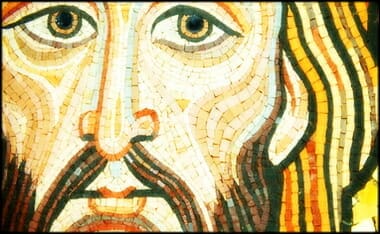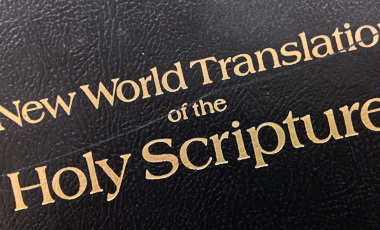— not uploaded in numerical order but a “CONTENTS/LINKS” will be added to all these posts when done ––
(The video that follows this one can be viewed here.) In this [my] upload of a larger series on Jehovah’s Witnesses and their obfuscating our Lord’s Divinity, we see the Greek word for Lord, Kurios (GK κύριος), in 1st and 2nd Thessalonians strategically mistranslated for dogmatic reasons. (These two videos below are connected)
(I forgot to add sub titles to this RUMBLE upload. I added them for my YouTube file) In this part — I got side-tracked in my normal OCD sense and did an in-depth dive into this segment of the presentation.
Here are some of the graphics used in the video, as well as some extra material:
Downloads
This is a PDF of chapter 3 (The Divine Name) of Robert Countess’ book,
- “The Jehovah’s Witnesses’ New Testament: A Critical Analysis of The New World Translation of The Christian Greek Scriptures,” pages 19-40.
A must read! (The entire book can be read here at ARCHIVES.)
Return of the Kurios:
- The Divine Name Will Endure Forever (links to more resources in this PDF | text below as well)
- 1st and 2nd Thessalonians Strong’s Concordance KURIOS/LORD vs. JEHOVAH (PDF)
- An excerpt[s] of the Forward to the 1969 and the 1985 editions of The Kingdom Interlinear Translation of the Greek Scriptures {KIT} (PDF | text below as well)
- Terms You Should Know: Exegesis vs. Eisegesis (VIDEO used from KINGDOM NETWORKS’s YouTube Channel)
- This wasn’t in the video, but is a hand-out from a and adult Sunday school class I taught at church filling in for the regular teacher/pastor: “Five Finger Life Punch” [the title was adapted from the band “Five Finger Death Punch”]
- Likewise, I did not display this, but this PDF is every full verse in the CSB version of the Bible, the NWT version, as well as the “Greek-English New Testament: Nestle-Aland 28th Edition and English Standard Version” (NA28) (text is below as well)
Day of the LORD
- 2nd Thessalonians 1:9 – Commentaries and Dictionaries | PDF
- (1969) Kingdom Interlinear of 2nd Thessalonians 1:7-9 | JPG
- J. Vernon McGee’s sermon titled, “Darkness and Light, The Day of the Lord” | YOUTUBE (transcript)
- NIV/Hebrew Interlinear of ISAIAH CHAPTER 2 — via John R. Kohlenberger, III, The interlinear NIV Hebrew-English Old Testament (Grand Rapids, MI: Zondervan Publishing, 1987) | PDF
Text of some of the quotes:
One translation that boldly restores God’s name with good authority is the New World Translation of the Christian Greek Scriptures. This version, currently available in 11 modern languages, including English, has restored God’s name every time that a portion of the Hebrew Scriptures containing it is quoted in the Greek Scriptures. Altogether, the name appears with a sound basis 237 times in that translation of the Greek Scriptures.
The Divine Name Will Endure Forever (New York, NY: Watchtower Bible and Track Society, 1984), 27.
How is a modern translator to know or determine when to render the Greek words κύριος and θεῖος into the divine name in his version? By determining where the inspired Christian writers have quoted from the Hebrew Scriptures. Then he must refer back to the original to locate whether the divine name appears there. This way he can determine the identity to give to ky’ri•os and the•os’ and he can then clothe them with personality.
Realizing that this is the time and place for it, we have followed this course in rendering our version of the Christian Greek Scriptures. To avoid overstepping the bounds of a translator into the field of exegesis, we have tried to be most cautious about rendering the divine name, always carefully considering the Hebrew Scriptures. We have looked for some agreement with us by the Hebrew versions we consulted to confirm our own rendering. Thus, out of the 237 times that we have rendered the divine name in the body of our version, there are only two instances where we have no support or agreement from any of the Hebrew versions. But in these two instances, namely, Ephesians 6:8 and Colossians 3:13, we feel strongly supported by the context and by related texts in rendering the divine name. The notes in our lower margin show the support we have for our renderings from the Hebrew versions and other authorities.
The Kingdom Interlinear Translation of the Greek Scriptures (New York, NY: Watchtower Bible and Track Society, 1969), 18-19.
How may modern translators determine when to render the Greek words Ky’ri•os and The•os’ as the divine name? By determining where the inspired Christian writers have quoted from the Hebrew Scriptures. Then they must refer back to the Hebrew text to locate whether the divine name appears there. In this way they can determine the identity to be given to Ky’ri•os and The•os’, and make appropriate use of the personal name.
To avoid overstepping the bounds of a translator into the field of exegesis, we have tried to be most cautious about rendering the divine name, always carefully considering the Hebrew Scriptures as a background. We have looked for some agreement with us by the Hebrew versions we consulted to confirm our rendering. Thus, out of the 237 times that we have restored Jehovah’s name in the body of our translation, there is only one instance wherein we have no support or agreement from any of the Hebrew versions. But in this one instance, namely, at 1 Corinthians 7:17, the context and related texts strongly support restoring the divine name
The Kingdom Interlinear Translation of the Greek Scriptures (New York, NY: Watchtower Bible and Track Society, 1985), 11-12.
[As an aside, I noticed in the 1985 version that the Greek was removed from this section of the Forward. I wonder if the Watchtower did so to impede -just a little- the curious Jehovah’s Witness from tracking down its use. Just me “spit balling.”]
Here is an in-depth comparison for the reader to use for their edification:
- CSB stands for — Christian Standard Bible
- NWT stands for — New World Translation of the Holy Scriptures
- NA28 stands for — Nestle-Aland Greek New Testament, 28th Edition, with Critical Apparatus (NA28)
1 THESS 1:1
(CSB) Paul, Silvanus, and Timothy: To the church of the Thessalonians in God the Father and the Lord Jesus Christ. Grace to you and peace.
(NWT) Paul, Sil·vaʹnus, and Timothy, to the congregation of the Thes·sa·loʹni·ans in union with God the Father and the Lord Jesus Christ: May you have undeserved kindness and peace.
(NA28) Παῦλος καὶ Σιλουανὸς καὶ Τιμόθεος τῇ ἐκκλησίᾳ Θεσσαλονικέων ἐν θεῷ πατρὶ καὶ κυρίῳ Ἰησοῦ Χριστῷ, χάρις ὑμῖν καὶ εἰρήνη.
1 THESS 1:3
(CSB) We recall, in the presence of our God and Father, your work produced by faith, your labor motivated by love, and your endurance inspired by hope in our Lord Jesus Christ.
(NWT) for we continually remember your faithful work, your loving labor, and your endurance because of your hope in our Lord Jesus Christ in the presence of our God and Father.
(NA28) μνημονεύοντες ὑμῶν τοῦ ἔργου τῆς πίστεως καὶ τοῦ κόπου τῆς ἀγάπης καὶ τῆς ὑπομονῆς τῆς ἐλπίδος τοῦ κυρίου ἡμῶν Ἰησοῦ Χριστοῦ ἔμπροσθεν τοῦ θεοῦ καὶ πατρὸς ἡμῶν,
1 THESS 1:6
(CSB) and you yourselves became imitators of us and of the Lord when, in spite of severe persecution, you welcomed the message with joy from the Holy Spirit.
(NWT) And you became imitators of us and of the Lord, seeing that you accepted the word under much tribulation with joy of holy spirit,
(NA28) Καὶ ὑμεῖς μιμηταὶ ἡμῶν ἐγενήθητε καὶ τοῦ κυρίου, δεξάμενοι τὸν λόγον ἐν θλίψει πολλῇ μετὰ χαρᾶς πνεύματος ἁγίου,
1 THESS 1:8
(CSB) For the word of the Lord rang out from you, not only in Macedonia and Achaia, but in every place that your faith in God has gone out. Therefore, we don’t need to say anything,
(NWT) The fact is, not only has the word of Jehovah sounded out from you in Mac·e·doʹni·a and A·chaʹia but your faith in God has spread abroad in every place, so that we do not need to say anything.
(NA28) ἀφʼ ὑμῶν γὰρ ἐξήχηται ὁ λόγος τοῦ κυρίου οὐ μόνον ἐν τῇ Μακεδονίᾳ καὶ [ἐν τῇ] Ἀχαΐᾳ, ἀλλʼ ἐν παντὶ τόπῳ ἡ πίστις ὑμῶν ἡ πρὸς τὸν θεὸν ἐξελήλυθεν, ὥστε μὴ χρείαν ἔχειν ἡμᾶς λαλεῖν τι.
1 THESS 2:15
(CSB) who killed the Lord Jesus and the prophets and persecuted us. They displease God and are hostile to everyone,
(NWT) who even killed the Lord Jesus and the prophets and persecuted us. Furthermore, they are not pleasing God, but are against the interests of all men,
(NA28) τῶν καὶ τὸν κύριον ἀποκτεινάντων Ἰησοῦν καὶ τοὺς προφήτας καὶ ἡμᾶς ἐκδιωξάντων καὶ θεῷ μὴ ἀρεσκόντων καὶ πᾶσιν ἀνθρώποις ἐναντίων,
1 THESS 2:19
(CSB) For who is our hope or joy or crown of boasting in the presence of our Lord Jesus at his coming? Is it not you?
(NWT) For what is our hope or joy or crown of exultation before our Lord Jesus at his presence? Is it not in fact you?
(NA28) τίς γὰρ ἡμῶν ἐλπὶς ἢ χαρὰ ἢ στέφανος καυχήσεως — ἢ οὐχὶ καὶ ὑμεῖς — ἔμπροσθεν τοῦ κυρίου ἡμῶν Ἰησοῦ ἐν τῇ αὐτοῦ παρουσίᾳ;
1 THESS 3:8
(CSB) For now we live, if you stand firm in the Lord.
(NWT) Because we are revitalized if you are standing firm in the Lord.
(NA28) ὅτι νῦν ζῶμεν ἐὰν ὑμεῖς στήκετε ἐν κυρίῳ.
1 THESS 3:11
(CSB) Now may our God and Father himself, and our Lord Jesus, direct our way to you.
(NWT) Now may our God and Father himself and our Lord Jesus make a way for us to come to you.
(NA28) Αὐτὸς δὲ ὁ θεὸς καὶ πατὴρ ἡμῶν καὶ ὁ κύριος ἡμῶν Ἰησοῦς κατευθύναι τὴν ὁδὸν ἡμῶν πρὸς ὑμᾶς·
1 THESS 3:12
(CSB) And may the Lord cause you to increase and overflow with love for one another and for everyone, just as we do for you.
(NWT) Moreover, may the Lord cause you to increase, yes, to abound in love for one another and for all, just as we do for you,
(NA28) ὑμᾶς δὲ ὁ κύριος πλεονάσαι καὶ περισσεύσαι τῇ ἀγάπῃ εἰς ἀλλήλους καὶ εἰς πάντας καθάπερ καὶ ἡμεῖς εἰς ὑμᾶς,
1 THESS 3:13
(CSB) May he make your hearts blameless in holiness before our God and Father at the coming of our Lord Jesus with all his saints. Amen.
(NWT) so that he may make your hearts firm, blameless in holiness before our God+ and Father at the presence of our Lord Jesus with all his holy ones.
(NA28) εἰς τὸ στηρίξαι ὑμῶν τὰς καρδίας ἀμέμπτους ἐν ἁγιωσύνῃ ἔμπροσθεν τοῦ θεοῦ καὶ πατρὸς ἡμῶν ἐν τῇ παρουσίᾳ τοῦ κυρίου ἡμῶν Ἰησοῦ μετὰ πάντων τῶν ἁγίων αὐτοῦ[, ἀμήν].
1 THESS 4:1
(CSB) Additionally then, brothers and sisters, we ask and encourage you in the Lord Jesus, that as you have received instruction from us on how you should live and please God—as you are doing—do this even more.
(NWT) Finally, brothers, just as you received instruction from us on how you should walk in order to please God, just as you are in fact walking, we request you and appeal to you by the Lord Jesus to keep doing it more fully.
(NA28) Λοιπὸν οὖν, ἀδελφοί, ἐρωτῶμεν ὑμᾶς καὶ παρακαλοῦμεν ἐν κυρίῳ Ἰησοῦ, ἵνα καθὼς παρελάβετε παρʼ ἡμῶν τὸ πῶς δεῖ ὑμᾶς περιπατεῖν καὶ ἀρέσκειν θεῷ, καθὼς καὶ περιπατεῖτε, ἵνα περισσεύητε μᾶλλον.
1 THESS 4:2
(CSB) For you know what commands we gave you through the Lord Jesus.
For you know the instructions we gave you through the Lord Jesus.
(NA28) οἴδατε γὰρ τίνας παραγγελίας ἐδώκαμεν ὑμῖν διὰ τοῦ κυρίου Ἰησοῦ.
1 THESS 4:6
(CSB) This means one must not transgress against and take advantage of a brother or sister in this manner, because the Lord is an avenger of all these offenses, as we also previously told and warned you.
(NWT) No one should go beyond proper limits and take advantage of his brother in this matter, because Jehovah exacts punishment for all these things, just as we told you previously and also strongly warned you.
(NA28) τὸ μὴ ὑπερβαίνειν καὶ πλεονεκτεῖν ἐν τῷ πράγματι τὸν ἀδελφὸν αὐτοῦ, διότι ἔκδικος κύριος περὶ πάντων τούτων, καθὼς καὶ προείπαμεν ὑμῖν καὶ διεμαρτυράμεθα.
1 THESS 4:15
(CSB) For we say this to you by a word from the Lord: We who are still alive at the Lord’s coming will certainly not precede those who have fallen asleep.
(NWT) For this is what we tell you by Jehovah’s word, that we the living who survive to the presence of the Lord will in no way precede those who have fallen asleep in death;
(NA28) Τοῦτο γὰρ ὑμῖν λέγομεν ἐν λόγῳ κυρίου, ὅτι ἡμεῖς οἱ ζῶντες οἱ περιλειπόμενοι εἰς τὴν παρουσίαν τοῦ κυρίου οὐ μὴ φθάσωμεν τοὺς κοιμηθέντας·
1 THESS 4:16
(CSB) For the Lord himself will descend from heaven with a shout, with the archangel’s voice, and with the trumpet of God, and the dead in Christ will rise first.
(NWT) because the Lord himself will descend from heaven with a commanding call, with an archangel’s voice and with God’s trumpet, and those who are dead in union with Christ will rise first.
(NA28) ὅτι αὐτὸς ὁ κύριος ἐν κελεύσματι, ἐν φωνῇ ἀρχαγγέλου καὶ ἐν σάλπιγγι θεοῦ, καταβήσεται ἀπʼ οὐρανοῦ καὶ οἱ νεκροὶ ἐν Χριστῷ ἀναστήσονται πρῶτον,
1 THESS 4:17
(CSB) Then we who are still alive, who are left, will be caught up together with them in the clouds to meet the Lord in the air, and so we will always be with the Lord.
(NWT) Afterward we the living who are surviving will, together with them, be caught away in clouds to meet the Lord in the air; and thus we will always be with the Lord.
(NA28) ἔπειτα ἡμεῖς οἱ ζῶντες οἱ περιλειπόμενοι ἅμα σὺν αὐτοῖς ἁρπαγησόμεθα ἐν νεφέλαις εἰς ἀπάντησιν τοῦ κυρίου εἰς ἀέρα· καὶ οὕτως πάντοτε σὺν κυρίῳ ἐσόμεθα.
1 THESS 5:2
(CSB) For you yourselves know very well that the day of the Lord will come just like a thief in the night.
(NWT) For you yourselves know very well that Jehovah’s day is coming exactly as a thief in the night.
(NA28) αὐτοὶ γὰρ ἀκριβῶς οἴδατε ὅτι ἡμέρα κυρίου ὡς κλέπτης ἐν νυκτὶ οὕτως ἔρχεται.
1 THESS 5:9
(CSB) For God did not appoint us to wrath, but to obtain salvation through our Lord Jesus Christ,
(NWT) because God assigned us, not to wrath, but to the acquiring of salvation through our Lord Jesus Christ.
(NA28) ὅτι οὐκ ἔθετο ἡμᾶς ὁ θεὸς εἰς ὀργὴν ἀλλʼ εἰς περιποίησιν σωτηρίας διὰ τοῦ κυρίου ἡμῶν Ἰησοῦ Χριστοῦ
1 THESS 5:12
(CSB) Now we ask you, brothers and sisters, to give recognition to those who labor among you and lead you in the Lord and admonish you,
(NWT) Now we request you, brothers, to show respect for those who are working hard among you and presiding over you in the Lord and admonishing you;
(NA28) Ἐρωτῶμεν δὲ ὑμᾶς, ἀδελφοί, εἰδέναι τοὺς κοπιῶντας ἐν ὑμῖν καὶ προϊσταμένους ὑμῶν ἐν κυρίῳ καὶ νουθετοῦντας ὑμᾶς
1 THESS 5:23
(CSB) Now may the God of peace himself sanctify you completely. And may your whole spirit, soul, and body be kept sound and blameless at the coming of our Lord Jesus Christ.
(NWT) May the God of peace himself sanctify you completely. And may the spirit and soul and body of you brothers, sound in every respect, be preserved blameless at the presence of our Lord Jesus Christ.
(NA28) Αὐτὸς δὲ ὁ θεὸς τῆς εἰρήνης ἁγιάσαι ὑμᾶς ὁλοτελεῖς, καὶ ὁλόκληρον ὑμῶν τὸ πνεῦμα καὶ ἡ ψυχὴ καὶ τὸ σῶμα ἀμέμπτως ἐν τῇ παρουσίᾳ τοῦ κυρίου ἡμῶν Ἰησοῦ Χριστοῦ τηρηθείη.
1 THESS 5:27
(CSB) I charge you by the Lord that this letter be read to all the brothers and sisters.
(NWT) I am putting you under the solemn obligation by the Lord to have this letter read to all the brothers.
(NA28) Ἐνορκίζω ὑμᾶς τὸν κύριον ἀναγνωσθῆναι τὴν ἐπιστολὴν πᾶσιν τοῖς ἀδελφοῖς.
1 THESS 5:28
(CSB) The grace of our Lord Jesus Christ be with you.
(NWT) The undeserved kindness of our Lord Jesus Christ be with you.
Ἡ χάρις τοῦ κυρίου ἡμῶν Ἰησοῦ Χριστοῦ μεθʼ ὑμῶν.
2 THESS 1:1
(CSB) Paul, Silvanus, and Timothy: To the church of the Thessalonians in God our Father and the Lord Jesus Christ.
(NWT) Paul, Sil·vaʹnus, and Timothy, to the congregation of the Thes·sa·loʹni·ans in union with God our Father and the Lord Jesus Christ:
(NA28) Παῦλος καὶ Σιλουανὸς καὶ Τιμόθεος τῇ ἐκκλησίᾳ Θεσσαλονικέων ἐν θεῷ πατρὶ ἡμῶν καὶ κυρίῳ Ἰησοῦ Χριστῷ,
2 THESS 1:2
(CSB) Grace to you and peace from God our Father and the Lord Jesus Christ.
(NWT) May you have undeserved kindness and peace from God the Father and the Lord Jesus Christ.
(NA28) χάρις ὑμῖν καὶ εἰρήνη ἀπὸ θεοῦ πατρὸς [ἡμῶν] καὶ κυρίου Ἰησοῦ Χριστοῦ.
2 THESS 1:7
(CSB) and to give relief to you who are afflicted, along with us. This will take place at the revelation of the Lord Jesus from heaven with his powerful angels,
(NWT) But you who suffer tribulation will be given relief along with us at the revelation of the Lord Jesus from heaven with his powerful angels
καὶ ὑμῖν τοῖς θλιβομένοις ἄνεσιν μεθʼ ἡμῶν, ἐν τῇ ἀποκαλύψει τοῦ κυρίου Ἰησοῦ ἀπʼ οὐρανοῦ μετʼ ἀγγέλων δυνάμεως αὐτοῦ
2 THESS 1:8
(CSB) when he takes vengeance with flaming fire on those who don’t know God and on those who don’t obey the gospel of our Lord Jesus.
(NWT) in a flaming fire, as he brings vengeance on those who do not know God and those who do not obey the good news about our Lord Jesus.
(NA28) ἐν πυρὶ φλογός, διδόντος ἐκδίκησιν τοῖς μὴ εἰδόσιν θεὸν καὶ τοῖς μὴ ὑπακούουσιν τῷ εὐαγγελίῳ τοῦ κυρίου ἡμῶν Ἰησοῦ,
2 THESS 1:9
(CSB) They will pay the penalty of eternal destruction from the Lord’s presence and from his glorious strength
(NWT) These very ones will undergo the judicial punishment of everlasting destruction from before the Lord and from the glory of his strength,
(NA28) οἵτινες δίκην τίσουσιν ὄλεθρον αἰώνιον ἀπὸ προσώπου τοῦ κυρίου καὶ ἀπὸ τῆς δόξης τῆς ἰσχύος αὐτοῦ,
2 THESS 1:12
(CSB) so that the name of our Lord Jesus will be glorified by you, and you by him, according to the grace of our God and the Lord Jesus Christ.
(NWT) This is so that the name of our Lord Jesus may be glorified in you and you in union with him, according to the undeserved kindness of our God and of the Lord Jesus Christ.
ὅπως ἐνδοξασθῇ τὸ ὄνομα τοῦ κυρίου ἡμῶν Ἰησοῦ ἐν ὑμῖν, καὶ ὑμεῖς ἐν αὐτῷ, κατὰ τὴν χάριν τοῦ θεοῦ ἡμῶν καὶ κυρίου Ἰησοῦ Χριστοῦ.
2 THESS 2:1
(CSB) Now concerning the coming of our Lord Jesus Christ and our being gathered to him: We ask you, brothers and sisters,
(NWT) However, brothers, concerning the presence of our Lord Jesus Christ and our being gathered together to him, we ask you
(NA28) Ἐρωτῶμεν δὲ ὑμᾶς, ἀδελφοί, ὑπὲρ τῆς παρουσίας τοῦ κυρίου ἡμῶν Ἰησοῦ Χριστοῦ καὶ ἡμῶν ἐπισυναγωγῆς ἐπʼ αὐτὸν
2 THESS 2:2
(CSB) not to be easily upset or troubled, either by a prophecy or by a message or by a letter supposedly from us, alleging that the day of the Lord has come.
(NWT) not to be quickly shaken from your reason nor to be alarmed either by an inspired statement or by a spoken message or by a letter appearing to be from us, to the effect that the day of Jehovah is here.
(NA28) εἰς τὸ μὴ ταχέως σαλευθῆναι ὑμᾶς ἀπὸ τοῦ νοὸς μηδὲ θροεῖσθαι, μήτε διὰ πνεύματος μήτε διὰ λόγου μήτε διʼ ἐπιστολῆς ὡς διʼ ἡμῶν, ὡς ὅτι ἐνέστηκεν ἡ ἡμέρα τοῦ κυρίου·
ADDITIONAL NOTE:
In 2 Thes. 2,2 the KJV has “the day of Christ” following the 1550 “Textus receptus”, which has η ημερα του χριστου. More modern translations have “the day of the lord”, following the oldest and best Greek manuscripts, which have η ημερα του κυριου, as do the ancient translations, e.g. the Vulgate with dies Domini.
[….]
ἡ ἡμέρα τοῦ Χριστοῦ – the day of (the) Christ – is found in the majority of Greek manuscripts as well as in one version of the Codex Claromontanus (c. 550).
ἡ ἡμέρα τοῦ κυρίου – the day of the Lord – appears in the major 4th and 5th century Codices: Sinaiticus (4th c.), Alexandrinus (5th c.), Vaticanus (4th c.), Ephraemi (5th c.).
(via BIBLICAL HERMENEUTICS)
2 THESS 2:8
(CSB) and then the lawless one will be revealed. The Lord Jesus will destroy him with the breath of his mouth and will bring him to nothing at the appearance of his coming.
(NWT) Then, indeed, the lawless one will be revealed, whom the Lord Jesus will do away with by the spirit of his mouth and bring to nothing by the manifestation of his presence.
καὶ τότε ἀποκαλυφθήσεται ὁ ἄνομος, ὃν ὁ κύριος [Ἰησοῦς] ἀνελεῖ τῷ πνεύματι τοῦ στόματος αὐτοῦ καὶ καταργήσει τῇ ἐπιφανείᾳ τῆς παρουσίας αὐτοῦ,
2 THESS 2:13
(CSB) But we ought to thank God always for you, brothers and sisters loved by the Lord, because from the beginning God has chosen you for salvation through sanctification by the Spirit and through belief in the truth.
(NWT) However, we are obligated always to thank God for you, brothers loved by Jehovah, because from the beginning God selected you for salvation by sanctifying you with his spirit and by your faith in the truth.
(NA28) Ἡμεῖς δὲ ὀφείλομεν εὐχαριστεῖν τῷ θεῷ πάντοτε περὶ ὑμῶν, ἀδελφοὶ ἠγαπημένοι ὑπὸ κυρίου, ὅτι εἵλατο ὑμᾶς ὁ θεὸς ἀπαρχὴν εἰς σωτηρίαν ἐν ἁγιασμῷ πνεύματος καὶ πίστει ἀληθείας,
2 THESS 2:14
(CSB) He called you to this through our gospel, so that you might obtain the glory of our Lord Jesus Christ.
(NWT) He called you to this through the good news we declare, so that you may acquire the glory of our Lord Jesus Christ.
(NA28) εἰς ὃ [καὶ] ἐκάλεσεν ὑμᾶς διὰ τοῦ εὐαγγελίου ἡμῶν εἰς περιποίησιν δόξης τοῦ κυρίου ἡμῶν Ἰησοῦ Χριστοῦ.
2 THESS 2:16
(CSB) May our Lord Jesus Christ himself and God our Father, who has loved us and given us eternal encouragement and good hope by grace,
(NWT) Moreover, may our Lord Jesus Christ himself and God our Father, who loved us and gave everlasting comfort and good hope by means of undeserved kindness,
(NA28) Αὐτὸς δὲ ὁ κύριος ἡμῶν Ἰησοῦς Χριστὸς καὶ [ὁ] θεὸς ὁ πατὴρ ἡμῶν ὁ ἀγαπήσας ἡμᾶς καὶ δοὺς παράκλησιν αἰωνίαν καὶ ἐλπίδα ἀγαθὴν ἐν χάριτι,
2 THESS 3:1
(CSB) In addition, brothers and sisters, pray for us that the word of the Lord may spread rapidly and be honored, just as it was with you,
(NWT) Finally, brothers, carry on prayer for us, that the word of Jehovah may keep spreading rapidly and being glorified, just as it is with you,
Τὸ λοιπὸν προσεύχεσθε, ἀδελφοί, περὶ ἡμῶν, ἵνα ὁ λόγος τοῦ κυρίου τρέχῃ καὶ δοξάζηται καθὼς καὶ πρὸς ὑμᾶς,
2 THESS 3:3
(CSB) But the Lord is faithful; he will strengthen you and guard you from the evil one.
(NWT) But the Lord is faithful, and he will strengthen you and protect you from the wicked one.
(NA28) Πιστὸς δέ ἐστιν ὁ κύριος, ὃς στηρίξει ὑμᾶς καὶ φυλάξει ἀπὸ τοῦ πονηροῦ.
2 THESS 3:4
(CSB) We have confidence in the Lord about you, that you are doing and will continue to do what we command.
(NWT) Moreover, we have confidence in the Lord regarding you, that you are carrying out and will go on carrying out our instructions.
(NA28) πεποίθαμεν δὲ ἐν κυρίῳ ἐφʼ ὑμᾶς, ὅτι ἃ παραγγέλλομεν [καὶ] ποιεῖτε καὶ ποιήσετε.
2 THESS 3:5
(CSB) May the Lord direct your hearts to God’s love and Christ’s endurance.
(NWT) May the Lord continue to guide your hearts successfully to the love of God and to the endurance for the Christ.
Ὁ δὲ κύριος κατευθύναι ὑμῶν τὰς καρδίας εἰς τὴν ἀγάπην τοῦ θεοῦ καὶ εἰς τὴν ὑπομονὴν τοῦ Χριστοῦ.
2 THESS 3:6
(CSB) Now we command you, brothers and sisters, in the name of our Lord Jesus Christ, to keep away from every brother or sister who is idle and does not live according to the tradition received from us.
(NWT) Now we are giving you instructions, brothers, in the name of our Lord Jesus Christ, to withdraw from every brother who is walking disorderly and not according to the tradition that you received from us.
(NA28) Παραγγέλλομεν δὲ ὑμῖν, ἀδελφοί, ἐν ὀνόματι τοῦ κυρίου [ἡμῶν] Ἰησοῦ Χριστοῦ στέλλεσθαι ὑμᾶς ἀπὸ παντὸς ἀδελφοῦ ἀτάκτως περιπατοῦντος καὶ μὴ κατὰ τὴν παράδοσιν ἣν παρελάβοσαν παρʼ ἡμῶν.
2 THESS 3:12
(CSB) Now we command and exhort such people by the Lord Jesus Christ to work quietly and provide for themselves.
(NWT) To such people we give the order and exhortation in the Lord Jesus Christ that they should work quietly and eat food they themselves earn
(NA28) τοῖς δὲ τοιούτοις παραγγέλλομεν καὶ παρακαλοῦμεν ἐν κυρίῳ Ἰησοῦ Χριστῷ, ἵνα μετὰ ἡσυχίας ἐργαζόμενοι τὸν ἑαυτῶν ἄρτον ἐσθίωσιν.
2 THESS 3:16
(CSB) May the Lord of peace himself give you peace always in every way. The Lord be with all of you.
(NWT) Now may the Lord of peace himself give you peace constantly in every way. May the Lord be with all of you.
(NA28) Αὐτὸς δὲ ὁ κύριος τῆς εἰρήνης δῴη ὑμῖν τὴν εἰρήνην διὰ παντὸς ἐν παντὶ τρόπῳ. ὁ κύριος μετὰ πάντων ὑμῶν.
2 THESS 3:18
(CSB) The grace of our Lord Jesus Christ be with you all.
(NWT) The undeserved kindness of our Lord Jesus Christ be with all of you.
Ἡ χάρις τοῦ κυρίου ἡμῶν Ἰησοῦ Χριστοῦ μετὰ πάντων ὑμῶν.



















